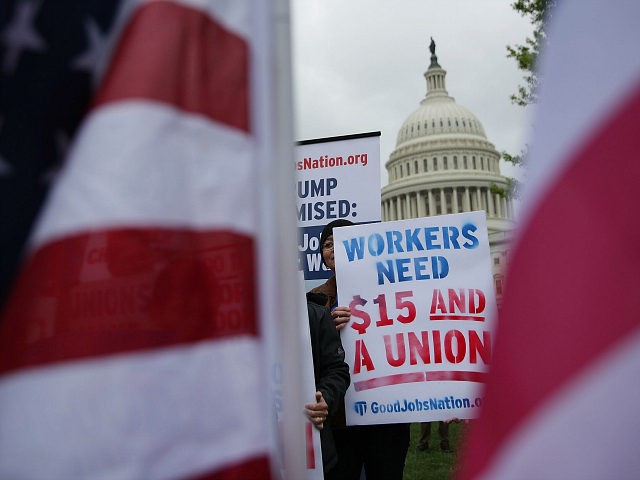Raising the minimum wage to $15 would give millions of American workers a raise but also result in 1.3 million losing their jobs, the nonpartisan Congressional Budget Office estimated in a report published Monday.
The federal minimum wage is currently $7.25, although several states have set much higher minimums. Democratic lawmakers in the House of Representatives have introduced a bill that would hike the minimum to $15.
The CBO study estimates that a hike to $15 in 2025 would boost the pay of 17 million workers who would otherwise be expected to earn less than $15 an hour. Another yen million who would earn slightly more than the minimum would also likely see pay hikes, according to the CBO.
But up to 3.7 million workers could lose their job. The CBO’s median estimate for job losses is 1.3 million.
The CBO also found that the hike would raise consumer prices and slightly shrink the country’s economic output by reducing capital investment.
The CBO said that raising the pay floor to $12 an hour would come at a cost 300,000 jobs and increase pay for five million workers. A hike to $10 would increase wages for 1.5 million Americans and not cost a significant number of jobs, according to the CBO’s estimate.
Although the legislation to hike the minimum wage is backed by Democrats, hiking the minimum wage has conservative backers as well. Donald Trump said in 2016 that he would support a hike to $10.
Some proponents of a high minimum wage argue that it would discourage illegal immigration.
“In effect, a much higher minimum wage serves to remove the lowest rungs in the employment ladder, thus preventing newly arrived immigrants from gaining their initial foothold in the economy,” Ron Unz wrote in a 2011 article for the American Conservative.
According to Unz, that would discourage low-skilled immigrants from arriving in the U.S.
Former Democratic presidential candidate Michael S. Dukakis and economists Daniel J.B. Mitchell made a similar argument in a 2006 New York Times op-ed.
If we want to reduce illegal immigration, it makes sense to reduce the abundance of extremely low-paying jobs that fuels it. If we raise the minimum wage, it’s possible some low-end jobs may be lost; but more Americans would also be willing to work in such jobs, thereby denying them to people who aren’t supposed to be here in the first place.
The new CBO study does not mention immigration.

COMMENTS
Please let us know if you're having issues with commenting.